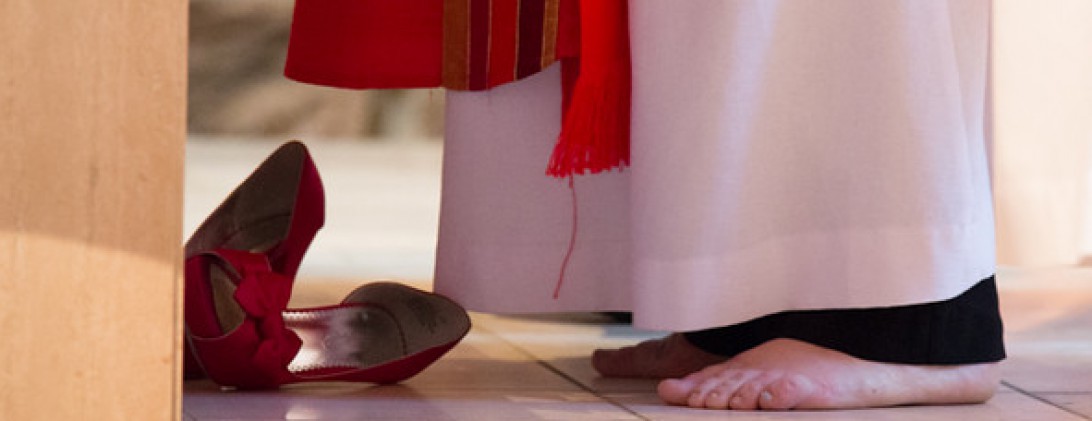The lights were bright. But not in the cheerful, welcoming Christmas way. Nor were they the holy, hopeful, Advent-waiting light. They were the jarring lights, that welcome complete exposure and clarity. But I did not stay in the light for long.
I saw a small group of people in the darkness, and I somehow intuited that I was supposed to be with them. Pulling through the open gates, into the harsh, bright lights, I handed my Driver’s License over to the officer and asked “can I go stand with them?”. “Are you here to protest?” he asked. I hesitated. I was there for that, to protest the execution of a man who killed a police officer. And as I looked into the face of the officer holding the card containing all my most personal information: name, address, height, weight, eye colour, I was not afraid. I was, however, worried he might be offended, worried he might roll his eyes at me, worried he might engage with me in a debate about how police are treated in this day and age. “Yes,” I said. And he, very politely, invited me to turn left. Three more officers, and two police dogs welcomed me into tree filled field.
“Get all your belongings before you leave,” the officer said. I locked my car and felt a breath of relief when I noticed that another clergy friend was also exiting his car. I greeted him and together we waited as the dogs sniffed his car for drugs and bombs. And together we walked to a cleared corral, sectioned off just for us. There I met a couple of other clergy, some activists who have long been attending these executions, one of W’s lawyers and some of W’s family and closest friends. It seems an extra insult to injury that the family must wait outside, with port-a-potties and the whims of the elements, while they wait for word that their beloved son/brother/uncle/friend has died.
I gathered with the people I knew. We made small talk. We held signs that no one else saw. The one I wanted “Thou shall not kill” was already being carried, so I took “An eye for an eye leaves the whole world blind”. One man never let go of his sign proclaiming that 144 people executed by the state were later found to be innocent. In total, there were about 20 or 25 of us, I think. I’ve never been too good at counting people. The Bishop of the Diocese where I currently serve made the comment “If you want to know what Calvary was like, you can imagine it was a lot like this.” His comment stuck with me throughout the night. It made sense. We were here, a few that, for whatever reason, needed to be there. The rest of the world was still spinning, doing things that needed to be done. And while the sky moved from dusk to dark, the moon began to rise and we waited.
In Jerusalem, etched into some of the ancient stones, ones that we imagine date back to the time of the crucifixions, back to the time of Jesus, there are markings. Imagine tic-tac-toe boards, only bigger. I’m told that the soldiers used these to pass the time while waiting for the crucified to die. On Good Friday, whenever I hear “they cast lots for his clothes,” my mind instantly goes to those games. Dice games, played on the streets, passing time, waiting for the human body to die, the heart to stop beating, because the government had decided death will somehow keep the rest of us alive. While the government kills, we cast lots and play dice and make small talk.
I would write of my encounters with his family. But they are not my stories to share. But if you’re taking time to read this (thank you!), I hope you know that W has a family. And they are wonderful. Funny and bright, kind and thoughtful. And they love W. And from all I can tell, W loves them too. A lot.
We waited, through 3 appeals, all denied. The moon continued to rise, and it went from hazy to pink to red. A harvest moon? A blood moon? And then it was back in its rightful spot, and traditional colour once again. Word finally came. The State had permission and clearance to kill W. It took 17 minutes for the poison to kill him. Seventeen minutes. Seventeen minutes of poison moving through his body, seventeen minutes of what? We were told, and suddenly there we were, at the foot of the cross, looking at the face of Mary, looking at the Magdalene, looking at the women who waited. Grief is that universal pain that stabs the heart the same today as it did back then. There is no cure for it, save maybe time and love.
And then it was over. And we got in our cars and left the empty field. Back to our lives. I got home and couldn’t get warm. My Chicago blood has thinned, five hours of standing in the December cold is a lot. I crawled in bed and shivered. “Seventeen minutes” I whispered my sleeping beloved, who woke up and held me as I struggled to get warm. “Seventeen minutes.” There has to be another way.


Powerful, heartbreaking, murder is murder. thak you.
LikeLike
This comment has been removed by the author.
LikeLike
Thanks Stpatti. I continue to be amazed that I live in a country that allows this to happen. God help us.
LikeLike